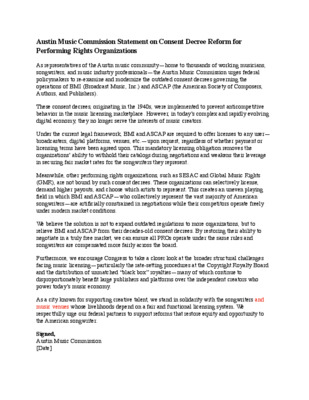Item 8 Supporting Document — original pdf
Backup

Austin Music Commission Statement on Consent Decree Reform for Performing Rights Organizations As representatives of the Austin music community—home to thousands of working musicians, songwriters, and music industry professionals—the Austin Music Commission urges federal policymakers to re-examine and modernize the outdated consent decrees governing the operations of BMI (Broadcast Music, Inc.) and ASCAP (the American Society of Composers, Authors, and Publishers). These consent decrees, originating in the 1940s, were implemented to prevent anticompetitive behavior in the music licensing marketplace. However, in today’s complex and rapidly evolving digital economy, they no longer serve the interests of music creators. Under the current legal framework, BMI and ASCAP are required to offer licenses to any user— broadcasters, digital platforms, venues, etc.—upon request, regardless of whether payment or licensing terms have been agreed upon. This mandatory licensing obligation removes the organizations’ ability to withhold their catalogs during negotiations and weakens their leverage in securing fair market rates for the songwriters they represent. Meanwhile, other performing rights organizations, such as SESAC and Global Music Rights (GMR), are not bound by such consent decrees. These organizations can selectively license, demand higher payouts, and choose which artists to represent. This creates an uneven playing field in which BMI and ASCAP—who collectively represent the vast majority of American songwriters—are artificially constrained in negotiations while their competitors operate freely under modern market conditions. We believe the solution is not to expand outdated regulations to more organizations, but to relieve BMI and ASCAP from their decades-old consent decrees. By restoring their ability to negotiate in a truly free market, we can ensure all PROs operate under the same rules and songwriters are compensated more fairly across the board. Furthermore, we encourage Congress to take a closer look at the broader structural challenges facing music licensing—particularly the rate-setting procedures at the Copyright Royalty Board and the distribution of unmatched “black box” royalties—many of which continue to disproportionately benefit large publishers and platforms over the independent creators who power today’s music economy. As a city known for supporting creative talent, we stand in solidarity with the songwriters and music venues whose livelihoods depend on a fair and functional licensing system. We respectfully urge our federal partners to support reforms that restore equity and opportunity to the American songwriter. Signed, Austin Music Commission [Date]